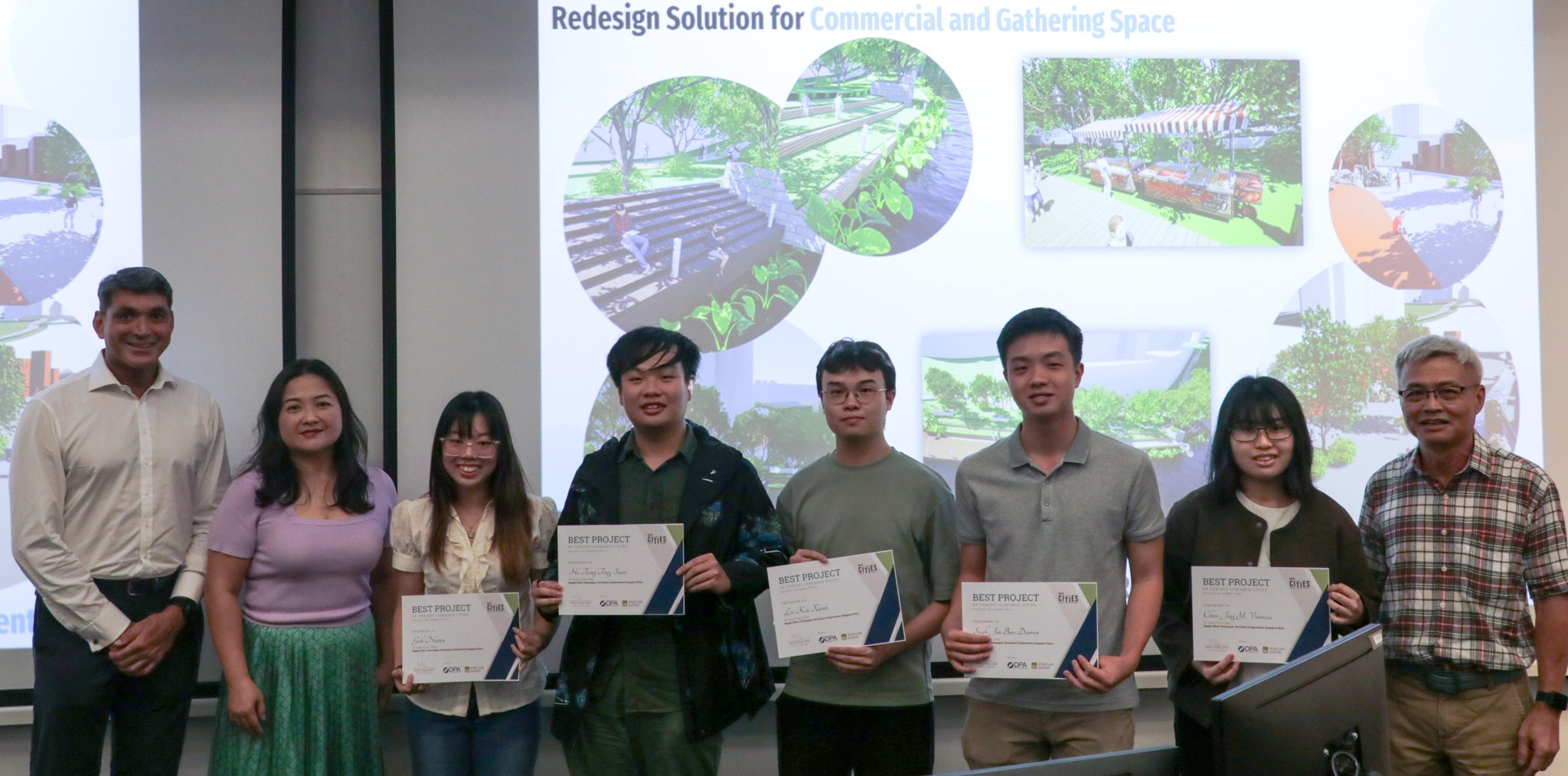PEDAGOGY
Reimagining liveability at NUS Cities
Liveable Cities is the flagship module of NUS Cities, where NUS undergraduates are introduced to what makes a city tick through introducing case studies from Singapore’s urban development, as well as through bringing in academics and practitioners who can share insights about cities from their expertise and experience. Students also learn through hands-on experiences in their studio projects, where they get to investigate a district in Singapore, identify real-life issues and craft integrated solutions to them. At the first Liveable Cities Best Projects competition, the two best projects selected, out of hundreds presented, were “Ripple Effect: Reimagine, Revitalise and Rejuvenate Singapore River” mentored by Lee Kwong Weng, and “Project TRANSIT” mentored by Yeung Lee. The winners will receive awards from the sponsors, DP Architects and Urban Land Institute. Lee Kwong Weng, a Studio Leader for NUS Cities for three semesters, shares his experiences teaching the Liveable Cities studio, his best practices for mentoring successful projects, and how he brings to bear his experience as a practitioner to guide the students well.

NUS Cities is an innovative platform to emphasise the importance of institutionalising an educational approach to interdisciplinary solutions for increasingly complex urban issues. NUS Cities resonates with my working experience. Hence, I gladly took on a Studio Leader role with the Liveable Cities studios.
Liveable Cities’ cross-discipline, project-based studio with no upfront assigned problem, and with no one right answer expected. This was a little disconcerting for some students who are more used to be given specific assessments. However, it is a very useful mental model for students to develop, as it frees them of preconceived notions and encourages an open-minded learning environment.
Getting students’ projects off the ground requires a methodical studio framework and close facilitation. The studio’s systems thinking approach, through its urban systems framework, provides a key anchor for students to piece things together. The emphasis on role-playing encourages students to empathise with, and resolve, different stakeholders’ conflicting demands.
As studio leader, I am obliged to guide the students through the unfamiliar studio framework, and to work effectively as a team with fellow students they are meeting for the first time. I am driven by the motivation to facilitate effective learning, and that students are able to meet their module requirements.
For instance, one key area is to guide the students to craft their problem statements sufficiently, to be challenging and workable for studio work, but not too heavy or technical to turn it into a PhD or engineering project. It is important for them go through the problem formulation process without the studio leader being prescriptive.
Occasionally, students may jump the gun with an attractive solution from an “Ah-ha!” moment. It is important not to unwittingly stifle their creativity or spontaneity. What is needed is to get the students to reconcile their attractive idea with their problem statement and systems framework to ensure rigour in the process. After all, when Sony created the Sony Walkman, it did not analyse consumers’ demand. Instead, the Walkman created new demand and a new market.
I find that, through taking a consistently encouraging tone, sharing relevant work experience during apt opportunities, and making the studios fun does help to ease the students’ anxieties and help get their interest and energies up. My experience with the students is positive. They warmed up quickly to studio work and many put in the effort to make a difference. They never fail to amaze me.
In the case of one of the winning team’s project on Revitalising Singapore River, the engineering students in the team even analysed river water samples. This was not a studio requirement. As it was, the project stood on its own merits, without the need to analyse water samples. But I certainly did not cool the team’s enthusiasm to exercise its version of an interdisciplinary approach to studio work. I additionally congratulate the other winning team, Project Transit, which works to improve the commuting experience for Transit Users within Punggol Town, where they may experience crowd congestion and safety hazards during peak periods.
The Liveable Cities studios are still relatively new. I have noted the responsive improvements made to running successive semesters’ studios based on feedback from studio leaders and students. Along with this, I could sense that students’ interest has picked up and overall performance has improved. Over time, if we continue to do so, I am confident that the Liveable Cities studios will continue to improve and become even more effective.

Lee Kwong Weng, previously Executive Director of the Council for Estate Agencies, has been a Studio Leader for three runs of NUS Cities’ Liveable Cities course.

